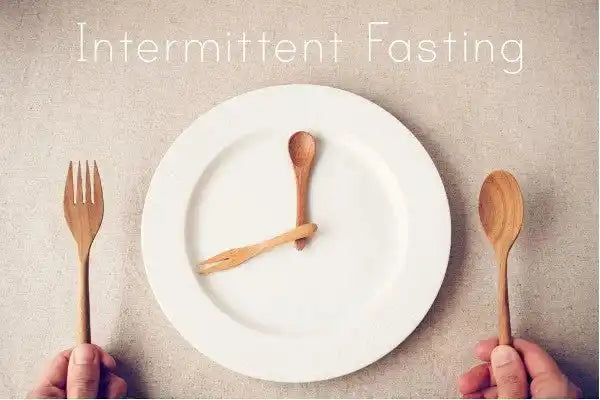Can You Repair Cells With Intermittent Fasting?
Friday Oct 7, 2022

There’s no shortage out there of diets to choose from. You have keto, paleo, vegan, and low FODMAP, just to name a few. All of these eating methods focus on WHAT you’re eating. But have you ever taken a step back and thought about WHEN you’re eating?
An intermittent fasting schedule—aka alternating between periods of fasting and eating—has been scientifically proven to:
- Be beneficial for gut health
- Melt away hard-to-lose visceral body fat
- Help reduce and stabilize blood sugar levels
Perhaps most important of all are the effects of intermittent fasting on healthy aging and disease.
What Is Intermittent Fasting?
Intermittent fasting simply involves going back and forth between scheduled periods of eating and fasting.
Types of Intermittent Fasting
Here are some of the more popular intermittent fasting methods:
- 16/8 intermittent fasting — Probably the most common type of intermittent fasting. You fast for 16 hours throughout the day, with an 8-hour eating window.
- 20/4 intermittent fasting — Fast for 20 hours with a 4-hour eating window.
- Alternate-day intermittent fasting — One day you eat like normal, then the next day, you fast. On the days you fast, people will typically have a small meal.
- 5:2 intermittent fasting — Choose 2 days during the week to restrict calories while eating like normal the other 5 days. For example, let’s say your daily calories are right at 2,200. You would eat this amount of calories 5 days out of the week and decrease your calories by about 500-750 the other 2 days. With this type of intermittent fasting, you want to make sure you’re not fasting on back-to-back days.
- One-meal-a-day intermittent fasting — Pretty much a 23/1 fast, where you get all your calories in one gigantic meal.
Does Fasting Promote Cell Regeneration?
Yes, fasting for cell repair is absolutely a thing! But what exactly happens to your cells when you intermittent fast? And why is it important?
Fasting sets off a process in the body known as cell autophagy. During cell autophagy, your body eliminates old and dysfunctional cells, replacing them with newer, better-functioning ones. Efficient cell autophagy enables your body to maintain homeostasis and keep its many processes working together at optimal levels.
Cell autophagy may hold the key to age-related diseases like Alzheimer’s and it’s also been linked to cancer prevention. There’s even a study out there on fruit flies that suggests intermittent fasting may be a sort of anti-aging hack.
Other Benefits of Intermittent Fasting
Aside from fasting for cell regeneration, there are many other benefits of intermittent fasting to consider. Let’s peel back the layers on some of them below.
Gut health benefits of intermittent fasting
The trillions of microbes that make up your gut microbiota are constantly working behind the scenes to keep things in order. But every once in a while, your gut just needs a break to decompress and reset. Intermittent fasting gives your gut a chance to do this.
Research also shows that intermittent fasting:
- Improves the richness and diversity of the bacteria in your gut. It results in more beneficial bacteria species, such as Clostridiales and Lactobacillales. Bacteria such as these produce lactase and acetate, which have been linked to increased muscle mass and fat-burning capabilities.
- Can provide an anti-inflammatory response that reduces oxidative stress, which can allow for healthy aging and preventing various chronic diseases, like Alzheimer’s and cancer.
Intermittent fasting for weight loss and burning fat
Is weight loss your primary goal? Do you have stubborn body fat you just can’t seem to get rid of? Intermittent fasting may be the answer to your weight loss and fat loss prayers.
It still comes down to calories in vs. calories out (i.e. if you burn more calories than you consume, then you’ll lose weight). However, intermittent fasting can play a hand in both how many calories you burn and how many calories you end up eating. So it’s like a double whammy for weight loss.
And the research backs up following intermittent fasting for weight loss. After following an intermittent fasting eating schedule for 10 weeks, one systematic review found that participants lost between 7-11 pounds on average.
Another collection of studies found that intermittent fasting helped participants achieve an average reduction in waist circumference of 4-7% over 6-24 weeks, suggesting they were able to shed visceral body fat. This type of body fat that’s found in your abdominal area has been associated with an increased risk of:
- Heart disease
- Type 2 diabetes
- Alzheimer’s
- High cholesterol
- Stroke
Intermittent fasting can improve insulin sensitivity and prevent type 2 diabetes
Have you been struggling to get your blood sugar under control? Consider giving intermittent fasting a try. It’s been shown to improve insulin sensitivity, which can help reduce blood sugar levels and your risk of type 2 diabetes.
Numerous studies demonstrate the fact that intermittent fasting is beneficial for managing blood glucose. For example, a study published in Cell Metabolism saw men with prediabetes improve insulin sensitivity and reduce insulin swings by following an intermittent fasting eating schedule.
Takeaway Points on Intermittent Fasting
Intermittent fasting (i.e. alternating between periods of fasting and eating) has many benefits for your health. There’s the benefit of fasting for cell repair, which involves the process of cell autophagy (where your body gets rid of old cells and replaces them with new ones). This keeps your body in homeostasis, promotes healthy aging, and prevents diseases.
You can also use intermittent fasting for:
- Creating a more diverse and healthier gut full of beneficial bacteria, like Clostridiales and Lactobacillales.
- Weight loss, as it increases your metabolic rate to help you burn more calories and since you have a fixed eating window, it can help you eat less.
- Reducing and stabilizing blood sugar levels, which may reduce your risk of type 2 diabetes.
Now that you’ve learned about when to eat, ready to dive into the what? Here’s our take on the best diet for gut health you’ll want to check out!
About the Author
Chad Richardson is a freelance writer from Cincinnati, OH who also enjoys going to the gym and doing his best Arnold Schwarzenegger impersonation, scrolling through Netflix trying to find a new binge-worthy show, and catching a game to root on his hometown sports teams.


